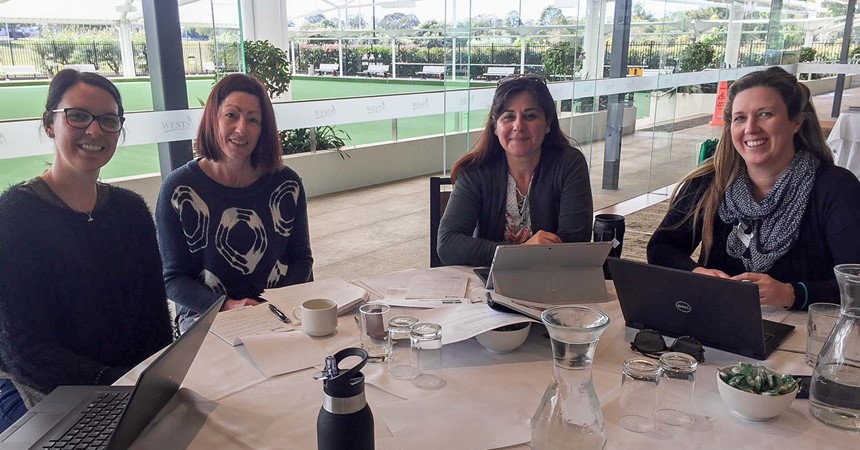The Catholic Schools Office’s new strategy for gifted education aims to help high-ability students to realise their full potential. With 20 Gifted Education Lead Schools (GELS) established so far, each has a Gifted Education Committee and Gifted Education Mentor to support gifted learners and their teachers to ensure the appropriate strategies are put in place to assist students.
While professional learning opportunities in gifted education have been available for schools for the last 10 years, mainly in the form of a two-day UNSW Mini-Certificate of Gifted Education course, in recent years the range of professional learning opportunities have increased. This to cater for the needs of teachers for Kindergarten through to Year 12 and to build capacity across the Diocese.
“We have had a whole range of opportunities,” said CSO Education Officer for Gifted Education, Sally Brock.
“These include two-day courses, one-day courses, master classes, refresher courses, staff meetings and online courses.
“Each of the Gifted Education Mentors receive training plus networking each term. The members of the school’s Gifted Education Committee have at least two days training. We’ve also had two days training for every Principal and Assistant Principal in the diocese and a professional learning day for the CSO Leadership Team and staff from Teaching and Learning.”
Teachers have also been offered scholarships by the CSO to complete gifted education postgraduate qualifications at either a Masters or Graduate Certificate level, as well as the opportunity to attend conferences such as the World Gifted Education Conference.
“A lot of this professional development focusses on how to identify gifted learners and how to cater for their needs,” Sally said.
“We have assisted with the implementation of the policy and procedure documents as well as strengthening differentiation strategies in class to meet the needs of all learners.”
One recent example of a professional learning opportunity was a series of creative writing teacher and student workshops facilitated by award-winning novelist, Felicity Castagna. This series of workshops brought together teachers and gifted writers, who spent the day going through the creative writing process.
“The benefit of this is the teachers are putting into practice the things they’re learning as they actually sit and work with their students. Students go back to their classes having learned something new and teachers have added to their skills too,” said Sally.
Similar workshops have also been run for debating and public speaking.
Nicole Burns from St Paul’s Catholic College, Booragul attended the debating workshop with students and noticed an improvement in their performance at the Year 8 Diocesan Debating Day as a result.
“The team did well and the girls themselves acknowledged that their success was largely due to the Enrichment Day,” said Nicole.
“Indeed, I noticed how polished they seemed and how they appeared to have taken on much of the advice given to them during the workshops.”
Sarah Elliott, the Gifted Education Mentor at All Saints’ College, St Peter’s Campus, Maitland has found that the professional learning opportunities have changed and strengthened her teaching practices.
“I always knew I needed to do more for some students in my classes but I didn’t have the structures or strategies to achieve what I desired,” said Sarah.
“I now feel, through this process, I can see my classroom differently, my purpose as a teacher differently and my learners differently.
“It has also built upon my capacity to look holistically at a school and implement a policy. I regularly ask myself where can I make the greatest impact with the opportunities I have been offered and I have been able to see where and also know how.”
The knowledge Sarah has gained from this professional development has enabled her to collaborate and work with others to improve gifted education practices.
“Through the Gifted Education Networking days, I have been able to share ideas and processes with other secondary GEMs within the diocese,” said Sarah.
“My most recent involvement was having the opportunity to present at the Wellbeing for Successful Learners Conference. It is my hope that some of what was presented that day might get other schools thinking about how they can cater for their various students’ learning needs.”
“We have developed an identification resource and we use a variety of assessments and teacher nomination processes to identify student’s academic strengths and abilities”, said Sally.
“A student can be gifted in one or more domain including intellectual, creative, social, perceptual and physical. Within the intellectual domain they may have particular strengths in one area or be gifted across many different areas.”
Each GEL school completes an action research and shares their learning with other schools in the diocese. Some schools surveyed staff to establish their understanding around what giftedness means, how to identify gifted students and the needs of gifted learners.
“Then they completed a series of professional learning activities, either in staff meetings or full-day courses throughout the term,” said Sally.
“The following term they repeated that survey and found some fairly significant changes even in that short time. Things like realising that gifted learners need different work, not more work.
“Other schools reported on teachers now identifying students that they hadn’t identified before - the teachers are looking differently at students because they have a better understanding of the characteristics and what to look for.
“I think most of our schools who have been involved would say the teachers are providing more differentiated work in the classroom and catering for the needs of all students.
“In this short time I think we’ve made some significant changes.”
The schools will share their work and research at the end of the year.
